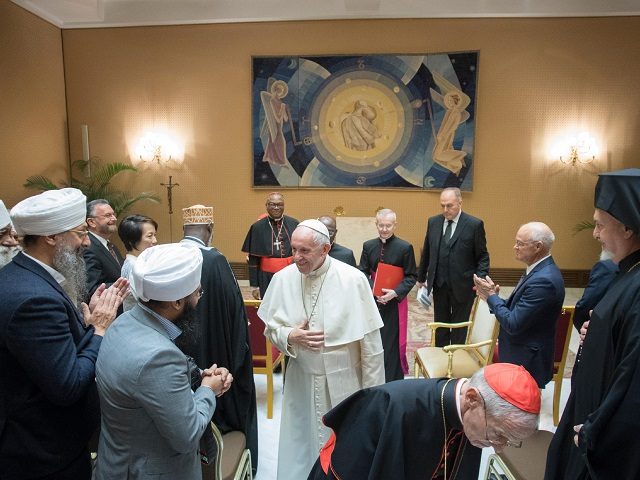In the wake of Somalia’s jihadist massacre last Saturday, Pope Francis told an interreligious gathering that those who justify acts of violence “in the name of religion” gravely offend God.
“Those who engage in acts of violence, or try to justify them in the name of religion, gravely offend God, who is peace and the source of peace, and has left in human beings a reflection of his wisdom, power and beauty,” Francis told a delegation of the organization “Religions for Peace” that met with him in the Vatican Wednesday.
The pope told the group that religions have a specific and unique role to play in building peace and “cannot be neutral, much less ambiguous, where peace is concerned.”
Later in the morning, Pope Francis denounced the jihadist slaughter of hundreds of Somalis during the weekend, calling the act a massacre that “deserves the strongest condemnation.”
“This terrorist act deserves the strongest condemnation and has fallen upon on a population that has already been sorely tried,” Francis said. “I pray for the dead and for the wounded, for their family members, and for all the people of Somalia. I pray for the conversion of the violent and encourage those who, with great difficulty, work for peace in that battered land.”
This past February, the Pope provoked outrage in some quarters by seeming to deny the existence of Islamic terrorism.
“Christian terrorism does not exist, Jewish terrorism does not exist, and Muslim terrorism does not exist. They do not exist,” Francis said in his speech to a world meeting of populist movements.
“No people is criminal or drug-trafficking or violent,” Francis said, while also suggesting—as he has on other occasions—that terrorism is primarily a result of economic inequalities rather than religious beliefs. “The poor and the poorer peoples are accused of violence yet, without equal opportunities, the different forms of aggression and conflict will find a fertile terrain for growth and will eventually explode.”
The pope also reiterated his conviction that all religions promote peace and that the danger of violent radicalization exists equally in all religions.
“There are fundamentalist and violent individuals in all peoples and religions—and with intolerant generalizations they become stronger because they feed on hate and xenophobia,” he said.
In an interview last year, Francis acknowledged that the “idea of conquest is inherent to the soul of Islam,” immediately adding, however, that “one could also interpret the end of Saint Matthew’s gospel, where Jesus sends out his disciples to all nations, as the same idea of conquest.”
Jesuit scholar Father James V. Schall, on the other hand, has written that Muslim violence is intrinsic to the nature of Islam itself, rather than its abuse.
A professor and author of more than two dozen books, Schall has insisted that the Muslim religion must be evaluated on its own terms, not through the lens of the Judeo-Christian West.
Islam’s consistent advocacy of violence, which has been practiced “from its seventh century beginning,” has a purpose, Schall proposes. “This purpose is, ultimately, religious and pious.”
Islam “is actually and potentially violent throughout its entire history,” Schall wrote, and the basic reason for this choice of violence “is obedience to the Law of Allah.”
“What we see now is little different from what has been seen throughout the centuries wherever Islam is found,” he said.
Just because Islam is a “religion,” Schall wrote, does not mean that it is not also “violent.”
Follow Thomas D. Williams on Twitter Follow @tdwilliamsrome

COMMENTS
Please let us know if you're having issues with commenting.